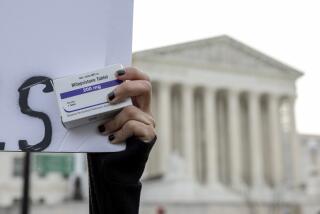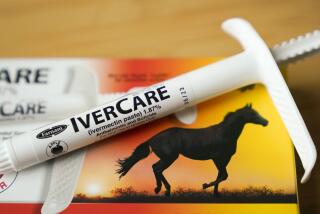Merck Loses Vioxx Case
- Share via
ANGLETON, Texas — A Texas jury found Merck & Co. liable Friday in the death of a 59-year-old marathon runner who took the once-popular pain reliever Vioxx, and awarded his widow $253.4 million.
The case drew national attention because it was the first of about 4,000 Vioxx wrongful death and injury lawsuits -- including hundreds in Los Angeles -- to reach trial.
The suits allege that the nation’s third-largest drug maker rushed Vioxx to market without adequate tests and downplayed risks of heart attacks and strokes from the blockbuster drug before voluntarily withdrawing it from the market last year.
After 10 hours of deliberation, jurors voted 10 to 2 to award $24.4 million in actual damages and $229 million in punitive damages to the family of Robert Ernst. He worked as a produce manager at Wal-Mart and died in his sleep of a heart problem in 2001 after taking Vioxx for eight months to ease pain in his hands.
Merck said it was disappointed by the verdict and would appeal. Several legal experts said the award was likely to be substantially reduced.
During the trial, the Ernst family’s lawyer argued that Merck documents showed that the company knew Vioxx was unsafe long before it warned consumers of the risks of the prescription drug.
“It’s nice to have been able to send a message to not only Merck, but the other pharmaceutical companies,” said Carol Ernst, Robert’s widow. “But it doesn’t bring Bob back.”
Several jurors said that company documents showed Merck seemed to care more about profits from the drug than the public’s welfare.
Stacy Smith, 21, said she was swayed by documents written by Merck executives. “They knew,” she said, “and they still put [Vioxx] out.”
Drugs such as Vioxx, and Pfizer Inc.’s Celebrex, were developed as more stomach-friendly treatments than other antiinflammatory drugs such as naproxen or Advil.
Vioxx generated $2.5 billion in sales for Merck last year. In September the company pulled the drug from the market after a study showed that it doubled the risk of heart attacks and strokes after 18 months of use. About 20 million patients used Vioxx.
Merck has vowed to fight each Vioxx suit and last year it set aside $675 million for legal expenses, although some analysts say its liability could be $18 billion. In the last quarter, Merck’s net income plunged 59% to $720.6 million, in part because of the loss of revenue from Vioxx.
Legal experts said that such a sizable verdict in what was seen as a weak case in Texas did not bode well for Merck and may lead to a flood of more lawsuits. “This could expose Merck to substantial liabilities,” said Carl Tobias, a professor at University of Richmond School of Law.
“Litigators and plaintiffs [are] likely to come out of the woodwork,” analyst David Moskowitz of Friedman Billings Ramsey warned investors in a note. “The number of lawsuits filed against the company will increase dramatically in the coming months.”
Merck’s stock fell nearly 8% on Friday to close at $28.06 a share, down $2.35.
Even if Merck loses the appeal in Texas, it is unlikely that the company would have to pay the full award. Under Texas law, the most in punitive damages that Ernst’s widow could collect is $1.65 million.
“I felt like we had truth and the jury was paying attention,” said Mark Lanier, lead attorney for the Ernst family. “They had a very tough case to defend. The documents are very difficult for Merck.”
Jonathan Skidmore, a lawyer on Merck’s defense team, said: “We believe that the plaintiff did not meet the standard set by Texas law to prove Vioxx caused Mr. Ernst’s death.”
Merck’s lawyers argued that Vioxx could not have caused Ernst’s death because his autopsy report said he died from an irregular heartbeat and clogged arteries.
“There is no reliable scientific evidence that shows Vioxx causes cardiac arrhythmias [irregular heartbeats],” Skidmore said.
However, the doctor who performed Ernst’s autopsy testified that he probably suffered a heart attack.
Skidmore also said that Merck was unjustly hit with punitive damages. The company, he said, “acted responsibly -- from researching Vioxx prior to approval in clinical trials involving almost 10,000 patients -- to monitoring the medicine while it was on the market -- to voluntarily withdrawing the medicine when it did.”
But some jurors said the evidence did not support that contention.
Juror Lorraine Blas, 41, said she reviewed several documents in the jury room and found a particularly damaging Merck e-mail on cardiovascular events and testing dating back years. “I felt Merck knew something was going on as early as 1997,” she said.
Juror Derrick Chizer, a Social Security service representative, said he was irritated that Merck failed to send any executives who were responsible for bringing Vioxx to market to the trial.
“Not one bigwig from Merck came down. Not one of them took the time,” Chizer said. “One death in my life would make a difference. Why wouldn’t it make a difference to them?”
One of the two jurors who dissented said he wasn’t convinced Vioxx played a role in Ernst’s death.
“I couldn’t see it in the science. Mr. Ernst had atherosclerosis,” said juror James Friudenberg, 46, a technician. “There are a lot of good people at Merck ... and I’m sorry it turned out like this.”
Financial analysts said the Vioxx litigation could drag on for decades. Tim Anderson, a physician and analyst for Prudential Equity Group, warned investors in a note to “prepare for a multi-year legal battle.”
Next month, Merck faces a Vioxx trial in New Jersey by a former postal worker who had a heart attack in 2001.
Some legal experts said the company could be forced to change its combative stance and pursue settlements if it continued to lose at trial.
“When the verdicts start coming in, things turn,” said Mark Robinson, a Newport Beach lawyer whose firm has filed more than 100 Vioxx suits and has hundreds more on tap.
Robinson, who sat in on part of the Texas trial, was one of several lawyers around the country who closely monitored the trial.
“This jury in Texas was not fooled at all,” said Tom Girardi, one of the lead lawyers in the Los Angeles Vioxx litigation. “It was pure greed with a total disregard of the health effects of the drug.”
Times staff writer Lisa Girion reported from Los Angeles; special correspondent Dana Calvo from Angleton, Texas.
More to Read
Inside the business of entertainment
The Wide Shot brings you news, analysis and insights on everything from streaming wars to production — and what it all means for the future.
You may occasionally receive promotional content from the Los Angeles Times.











